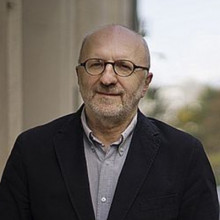Polish literature

Zbigniew Kruszyński
(born 1957) writes fiction, and is a translator and linguist. From 1984 to 2004 he lived in Sweden, where he worked as a linguist at Lund University, and was later associated with Stockholm University.
Zbigniew Kruszyński’s first novel, Schwedenkräuter, is an original, sophisticated take on the theme of losing one’s national identity and the problem of feeling alienated as experienced by modern émigrés. Historical Sketches is an ambitious attempt to reconstruct the fate of an individual as well as the experiences of a generation. The hero of the novel is a Polish intellectual born in the mid 1950s who gets embroiled in the political conflict of the early 1980s. Both novels are to a large extent autobiographical – the events described in the second one precede the first in terms of chronology. But it is not the plots so much as the highly refined language that grasps the reader’s attention. There is a lot of play on words and some surprising associations; Kruszyński readily uses metaphors, rhythms, effective extended similes and word combinations. In addressing issues to do with identity, existence and to a lesser degree politics, Kruszyński examines them from the linguistic aspect. This method is adjusted in his next book, a set of short stories called On Land and Sea. The publisher advertised the book as follows:
"The main characters are the castaways of the end of the century: a censor who feverishly goes on censoring what is now the free press, the widow of an apparatchik who thinks the world has stabbed her husband in the heart, an old teacher of a language no one speaks any more, a tramp who sits at the crossroads and judges the passers-by. The real world is easily recognisable here, like just around the corner."
And indeed, this collection of stories was read as a bitter diagnosis of the social reality of the time, as being about the human, psychological costs of the great change that happened in Poland in the 1990s.
Fans of Kruszyński’s work had to wait seven years for his next book, Alexander’s Return, which marked this excellent writer’s return to the literary scene. The book opens with four very short stories about communication problems, to put it mildly, about the difficulty, sometimes impossibility of understanding each other that even occurs between people who are close to each other. The jewel in this collection is the long title story, which is clearly autobiographical. After some years in Sweden, the main character arrives in Poland and makes a not exactly sentimental, or exactly stocktaking journey in the footsteps of his own youth. As in his debut novel, the main issue here is the problem of a blurred, complicated identity; the writer poses the question of whether or not it is possible to put down your roots again. As ever, he replies in the negative.
Building his narrative as precisely as a surgeon, and at the same time as rhythmically as a poet, this writer is more sensitive than any other to the qualities of language – he is one of the toughest, sharpest realists.
– Przemysław Czapliński
BIBLIOGRAPHY
- Schwedenkräuter, Kraków: Oficyna Literacka, 1995.
- Szkice historyczne. Powieść, [bez m. wyd.] Wydawnictwo Faust, 1996.
- Na lądach i morzach. Opisy i opowiadania, Warszawa: Wydawnictwo W.A.B., 1999.
- Powrót Aleksandra, Kraków: Wydawnictwo Literackie, 2006.
- Ostatni raport, Kraków: Wydawnictwo Literackie, 2009.
- Kurator, Warszawa: W.A.B./Grupa Foksal, 2014
TRANSLATIONS
German:
- Zu Lande und zur See [Na lądach i morzach], München: Dt. Verl.-Anst., 2005.
Russian:
- Na suše i na more [Na lądach i morzach], Moskva: Novoe Literaturnoe Obozrenie, 2003.